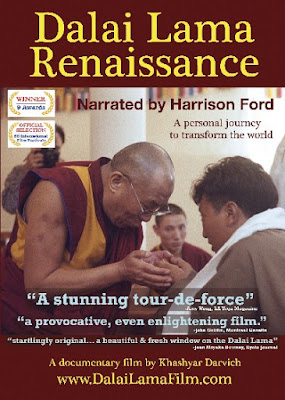Saturday, May 17, 2008
Dalai Lama Renaissance
 Tenzin Gyatso, the 14th Dalai Lama, perhaps is one of the most recognizable and most controversial figures today. Who is he? What is his teaching? What is his view on the current issues we are facing in the world?
Tenzin Gyatso, the 14th Dalai Lama, perhaps is one of the most recognizable and most controversial figures today. Who is he? What is his teaching? What is his view on the current issues we are facing in the world?
Although the documentary "Dalai Lama Renaissance" (USA 2007, 81 min.) does not answer all of these questions, it does give an up close profile to this extraordinary and complex individual. In 1999, 40 westerners with different religion background, disciplines, and of course, point of views, travel to India to meet the Dalai Lama at his residence. Their goal is to discuss many problems in the world we are facing today and gain perspectives through the direct dialogue with the Dalai Lama. Before they begin a discussion with the Dalai Lama during a limited time each day, these westerns debate and discuss among themselves trying to come up some kind of consensus about how to present their views to the Dalai Lama and how to proceed the dialogue. This film captures their spiritual journey, as well the Dalai Lama's teaching. In places like Germany, the Dalai Lama's undeniable charisma and likeable personality make himself more popular than the pope as a religious leader, and a respectable spiritual inspiration to many. Many footage of his teaching in this film effectively shows the Dalai Lama's passion for humanity as well as his wit and insight toward spirituality. He tells his audience to open heart and embrace the spirituality inside ourselves with or without any religious faith; and to achieve the inner peace within ourselves. It is indeed inspiring and thought provoking. It is also very interesting to observe how the 40 western participants react and interpret the Dalai Lama's teaching, and how naive some of them are by expecting that the Dalai Lama will give them solutions to the problems in the world. Many of the participants express themselves and their rewarding experience eloquently. Some of the participants obviously have the intention of using this meeting to get a vindication on their own political agenda from the Dalai Lama. Some others simply expose themselves for how ignorant and close minded they are even after the teaching from the Dalai Lama. Understandably, the filmmaker expresses his own point of view about the history and politics in Tibet, without necessarily reflecting the actual Tibetan history. To portrait the Dalai Lama as a victim of the Chinese government is anything but the truth. That's the tricky point when it comes to understand the Dalai Lama's role. The Dalai Lama is an almighty figure when he comes to be a religious and a humanitarian leader. He would have been embraced by the Chinese government if he dedicates himself to that role, which inspires millions of people around the world. However, he is also a politician, especially when he presents himself to the Chinese government and the Chinese people. By playing both roles, the Dalai Lama is able to mobilize the western media in his support to deal with the Chinese government, because to the westerners, he appears to be a religious and a spiritual leader. As a consequence, he becomes ambiguous and perplex when it comes to sensitive issues such as how to deal with the Chinese government. This dilemma shows dramatically in the film when an anti-Chinese government participant ask the Dalai Lama specifically if the Dalai Lama would approve an economical sanction against China over the issue of Tibet. The Dalai Lama first expresses his concern that such action will harm the welfare of the Chinese people, including Tibetan people. He emphasizes that people should not take any action to harm the Chinese people. Therefore, the logical answer one might think is that he does not approve such an action, right? Yet, he refuses to give an straight answer to that simple question. He winkes with a smile. What he preaches does not apply here any more. Strange? Not for a politician. Isn't the idea of "separation of church and state" absolutely brilliant? "Dalai Lama Renaissance" is an interesting documentary paying tribute to a fascinating individual. It opens on May 23 at the Roxie Theater in San Francisco. |
